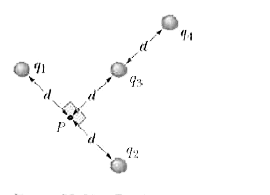An assembly of charges are at positions …. And so on from origin. What is the potential at , due to these charges ?
Topper's Solved these Questions
Similar Questions
An infinite number of charges each equal to q are placed along the x-axis at x=1m,x=2m,x=4m,x=8m, ... and so on. Find the potential and electric field at the point x = 0 due to this set of charges. What will be potential and electric field ifin the above set up if the consecutive charge have opposite sign?
[q2π∈0,q3π∈0,q6π∈0,q5π∈0]
View SolutionIn Fig., the four particles fixed in palce and have charges q1=q2=+5e,q3=+3e and q4=−1e. Distance d=8.0μm. What is the magnitude of the net electric field at point P due to the particles ?

View Solution
Knowledge Check
An assmebly of charges +q,−q,+q,−q….. are at positions x=1m,2m,4m,8m,…. And so on from origin. What is the potential at x=0, due to these charges ?
Aq4π∈0B−q4π∈0Cq6π∈0D−q6π∈0An infinite number of charges , each equal to q , are placed along the x - axis at x = 1, x=2,x=4,x=8 and so on . The potential at x = 0 due to this set of charges is
A4q2πε0B2q/4πε0Cq2πε0D2qπε0An infinite number of charges, each of magnitude q, are placed along x-axis at x = 1m, 2m, 4m, 8m, 16m and so on but the consecutive charges are of opposite sign starting with +q at x = 1m. A point charge q0 , kept at the origin, experiences a force of magnitude :
Aqq04πε0Bqq05πε0Cqq03πε0Dqq02πε0
A charge q1=2.00μC is located at the origin , and a charge q2=−6.00μC is located at (0,3.00)m.
(a) Find the total electric potential due to these charges at the point P hose coordinates are ( 4.00,0) m .
( b) Find the change in potential energy of the system of two charges plus a charge q3=3.00μC as the latter charge moves from infinity to point P .
View SolutionSuppose that three point charges, qa,qbandqc are arranged at the vertices of a right-angled triangle, as shown. What is the absolute potential at the position of the third charge, if qa=6.0μC,qb=+4.0μC,qc=+2.0μC,a=4.0mandb=3.0m ?

View SolutionAn infinite number of electric charges each equal to 5 nano coulombs are placed along x-axis at x = 1 cm, x-2 cm, x -4 cm, x = 8 cm,.. and so on. In this setup, if the consecutive charges have opposite sign, then the electric field in newton/coulomb at x =0 is
View SolutionA charge +q is fixed at each of the points x=x0, x=3x0, x=5x0,…………x=∞ on the x axis, and a charge −q is fixed at each of the points x=2x0, x=4x0, x=6x0, …………x=∞. Here x0 is a positive constant. Take the electric potential at a point due to a charge Q at a distance r from it to be Q/(4πε0r).Then, the potential at the origin due to the above system of
View SolutionA charge q=−2.0μC is placed at origin. Find the electric field at (3m,4m,0).
View Solution
